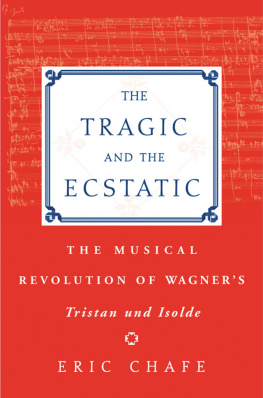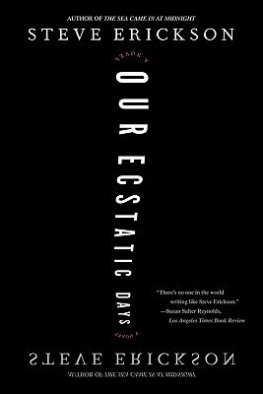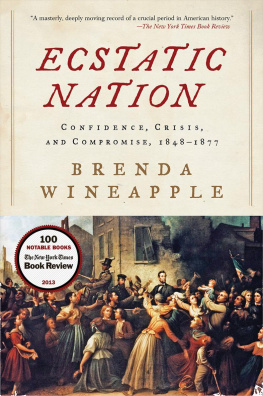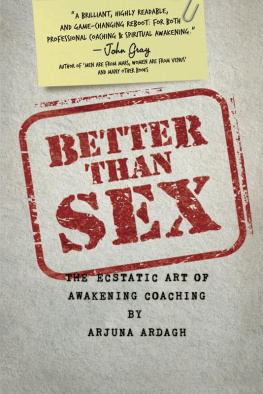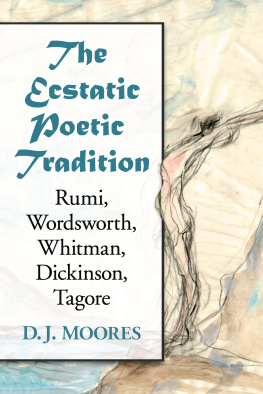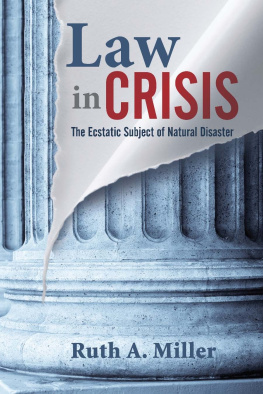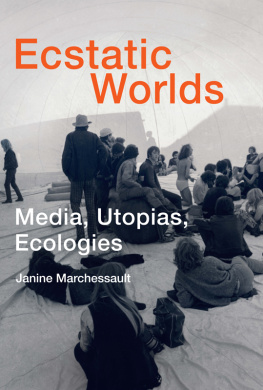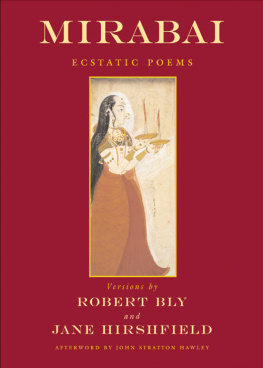Chafe - The Tragic and the Ecstatic
Here you can read online Chafe - The Tragic and the Ecstatic full text of the book (entire story) in english for free. Download pdf and epub, get meaning, cover and reviews about this ebook. year: 2015, publisher: OUP Premium, genre: Science. Description of the work, (preface) as well as reviews are available. Best literature library LitArk.com created for fans of good reading and offers a wide selection of genres:
Romance novel
Science fiction
Adventure
Detective
Science
History
Home and family
Prose
Art
Politics
Computer
Non-fiction
Religion
Business
Children
Humor
Choose a favorite category and find really read worthwhile books. Enjoy immersion in the world of imagination, feel the emotions of the characters or learn something new for yourself, make an fascinating discovery.
The Tragic and the Ecstatic: summary, description and annotation
We offer to read an annotation, description, summary or preface (depends on what the author of the book "The Tragic and the Ecstatic" wrote himself). If you haven't found the necessary information about the book — write in the comments, we will try to find it.
Chafe: author's other books
Who wrote The Tragic and the Ecstatic? Find out the surname, the name of the author of the book and a list of all author's works by series.
The Tragic and the Ecstatic — read online for free the complete book (whole text) full work
Below is the text of the book, divided by pages. System saving the place of the last page read, allows you to conveniently read the book "The Tragic and the Ecstatic" online for free, without having to search again every time where you left off. Put a bookmark, and you can go to the page where you finished reading at any time.
Font size:
Interval:
Bookmark:


Great Clarendon Street, Oxford OX2 6DP
Oxford University Press, Inc., publishes works that further
Oxford Universitys objective of excellence
in research, scholarship, and education.
OxfordNew York
AucklandCape TownDar es SalaamHong KongKarachi
Kuala LumpurMadridMelbourneMexico CityNairobi
New DelhiShanghaiTaipeiToronto
With offices in
ArgentinaAustriaBrazilChileCzech RepublicFranceGreece
GuatemalaHungaryItalyJapanPolandPortugalSingapore
South KoreaSwitzerlandThailandTurkeyUkraineVietnam
Copyright 2005 by Oxford University Press, Inc.
Published by Oxford University Press, Inc.
198 Madison Avenue, New York, New York 10016
www.oup.com
Oxford is a registered trademark of Oxford University Press
All rights reserved. No part of this publication may be reproduced,
stored in a retrieval system, or transmitted, in any form or by any means,
electronic, mechanical, photocopying, recording, or otherwise,
without the prior permission of Oxford University Press.
Library of Congress Cataloging-in-Publication Data
Chafe, Eric Thomas, 1946
The tragic and the ecstatic : the musical revolution of Wagners Tristan and Isolde / Eric Chafe.
p. cm.
Includes bibliographical references and index.
ISBN-13 9780195176476
ISBN 0195176472
1. Wagner, Richard, 18131883. Tristan und Isolde. 2. Schopenhauer, Arthur, 17881860
Views on music. 3. MusicPhilosophy and aesthetics. I. Title.
ML410.W14C432004
782.1dc222004007871
To my friend and colleague Martin Boykan
FOR MANY YEARS I have felt the need for a study of Tristan and Isolde that would do justice to the influence of Arthur Schopenhauers philosophy on its musicodramatic character and design. Many studies have dealt with the influence of Schopenhauer on Wagner in a general way, whereas others have made it their central theme. Some of these studies, most notably in English Bryan Magees The Philosophy of Schopenhauer and his Wagner and Philosophy, have greatly illuminated our understanding of the subject from the standpoint of Wagners biography, his philosophical interests in general, and the poetic text of Tristan and the operas that followed it in Wagners oeuvre. Bridging the gap between those investigations and the composition of the music has proven less tractable, however. I hope with this study to carry the torch further, even to lay a basis for understanding the processes by which extramusical ideas, philosophical and other, became the material of musical designs for Wagner.
I have been helped in this undertaking by many persons. Some have given me concrete assistance in the preparation of the manuscript or acquisition of source material. Among them are Ray Komow,Heather Shaw-Philips, Joseph Morgan, Rachel Cama, Annegret Klaua, Michael Hamad, Rick Beaudoin, Silvio dos Santos, and Katarina Markovi-Stokes. A few persons have given selflessly of their valuable time reading drafts of part or all of this book and making suggestions, most of which I have followed: William Youngren, Bonnie Gordon, and Elizabeth Joyce.Mr. Gnther Fischer and the staff of the Richard-Wagner Archive in Bayreuth gave every possible assistance to my study of the original sources on the spot and through photocopies. And the Brandeis University Mazer Fund for Faculty Research supported this project with grants that enabled me to meet some of the expenses.
I gratefully acknowledge permission from Penguin Books to cite excerpts from A. T. Hattos magnificent English prose translation of Gottfried von Strassburgs Tristan. Schott and Co., London, gave me permission to use a modified version of the 1906 London edition of Karl Klingworths piano-vocal score of Tristan for many of the musical examples (piano-vocal reduction by Karl Klingworth Schott). I have made corrections and adjustments to Klingworths score where it seemed necessary, as well as removing obvious pianistic elements. And the Richard Wagner Archive in Bayreuth gave me permission to reproduce the five photographs from Wagners compositional draft in the appendix. I am grateful to Gertrude Fttinger for her assistance in this regard.
Among those who have helped me out in very substantive ways relating to the content of the book itself, one person stands out, both for his depth of understanding of Tristan, Wagner, and music in general, and for the patience and generosity in listening and becoming involved in someones elses work that very few persons are willing to give. I am speaking of my friend and colleague of more than twenty years, composer Martin Boykan, who shared his profound musical understanding on occasions vastly too numerous even to remember. Marty has taught composition and analysis at Brandeis for well over forty years now; and there are a great many musicians across the country who will know what I am talking about. I have been unusually lucky to have such a resource close at hand, and dedicating this book to him is the best way I can think of to thank him.
IF THERE IS ONE SINGLE QUALITY of Wagners Tristan und Isolde that underlies its fascination for musicians, culture historians, and a substantial segment of the opera-loving public from its own time to the present, it is that, more than any other work in the Western musical canon, Tristan embodies a vision of human existence in which the tragic and the ecstatic are interwoven, a vision encompassing much that had formerly been the province of religion and that its author now proclaimed the domain of art. That vision drew Wagner to study myth and philosophy, literature and Eastern religion; and it enabled him to recognize qualities in Gottfried von Strassburgs Tristan und Isolt that reached across the centuries, bridging the two greatest eras in all of German literature. Once realized in the unique sound world that forms the Tristan style, it communicated itself to all around him, most notably the young Friedrich Nietzsche, and it spread rapidly through Europe and the Western world. By now its influence, direct or indirect, is incalculable.
Wagners vision is clear from the earliest reference to his plan to compose an opera on Tristan and Isolde, a letter to Franz Liszt of December 1854. This letter is also Wagners first announcement of his discovery of Schopenhauer:
I have now become exclusively preoccupied with a man whoalbeit only in literary formhas entered my lonely life like a gift from heaven. It is Arthur Schopenhauer, the greatest philosopher since Kant, whose ideasas he himself puts ithe is the first person to think through to their logical conclusion. His principal idea, the final denial of the will to live, is of terrible seriousness, but it is uniquely redeemingI havefound a sedative which has finally helped me to sleep at night; it is the sincere and heartfelt yearning for death: total unconsciousness, complete annihilation, the end of all dreamsthe only redemption!.
But since I have never in my life enjoyed the true happiness of love, I intend to erect a further monument to this most beautiful of dreams, a monument in which this love will be properly sated from beginning to end: I have planned in my head a Tristan and
A decade later Wagner maintained that he had always viewed Gottfrieds Tristan poem (which he had known since the 1840s) as innately tragic, adding, it was no doubt in part the earnest frame of mind produced by Schopenhauer, now demanding some rapturous expression of its fundamental traits, which gave me the idea for a
Font size:
Interval:
Bookmark:
Similar books «The Tragic and the Ecstatic»
Look at similar books to The Tragic and the Ecstatic. We have selected literature similar in name and meaning in the hope of providing readers with more options to find new, interesting, not yet read works.
Discussion, reviews of the book The Tragic and the Ecstatic and just readers' own opinions. Leave your comments, write what you think about the work, its meaning or the main characters. Specify what exactly you liked and what you didn't like, and why you think so.

